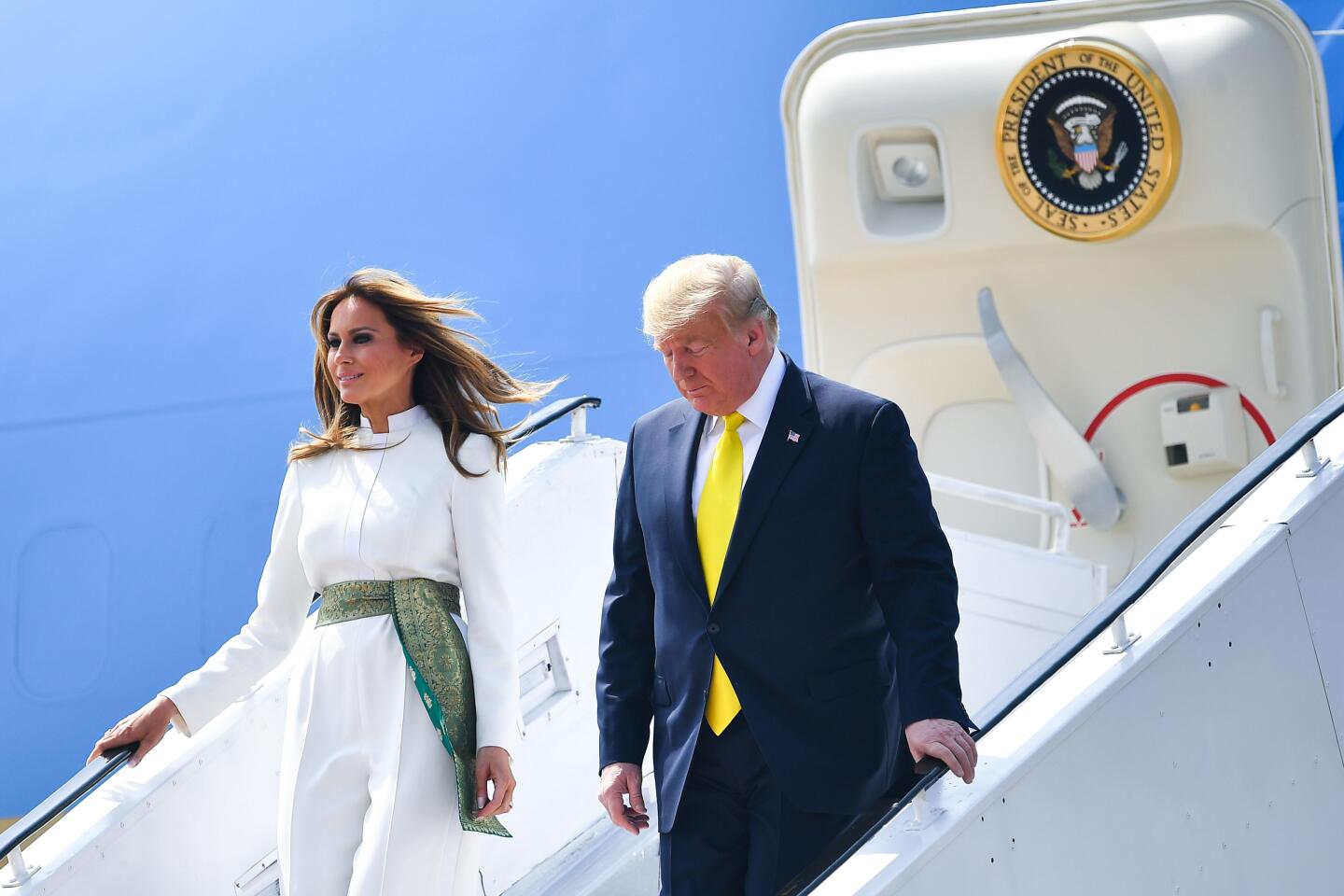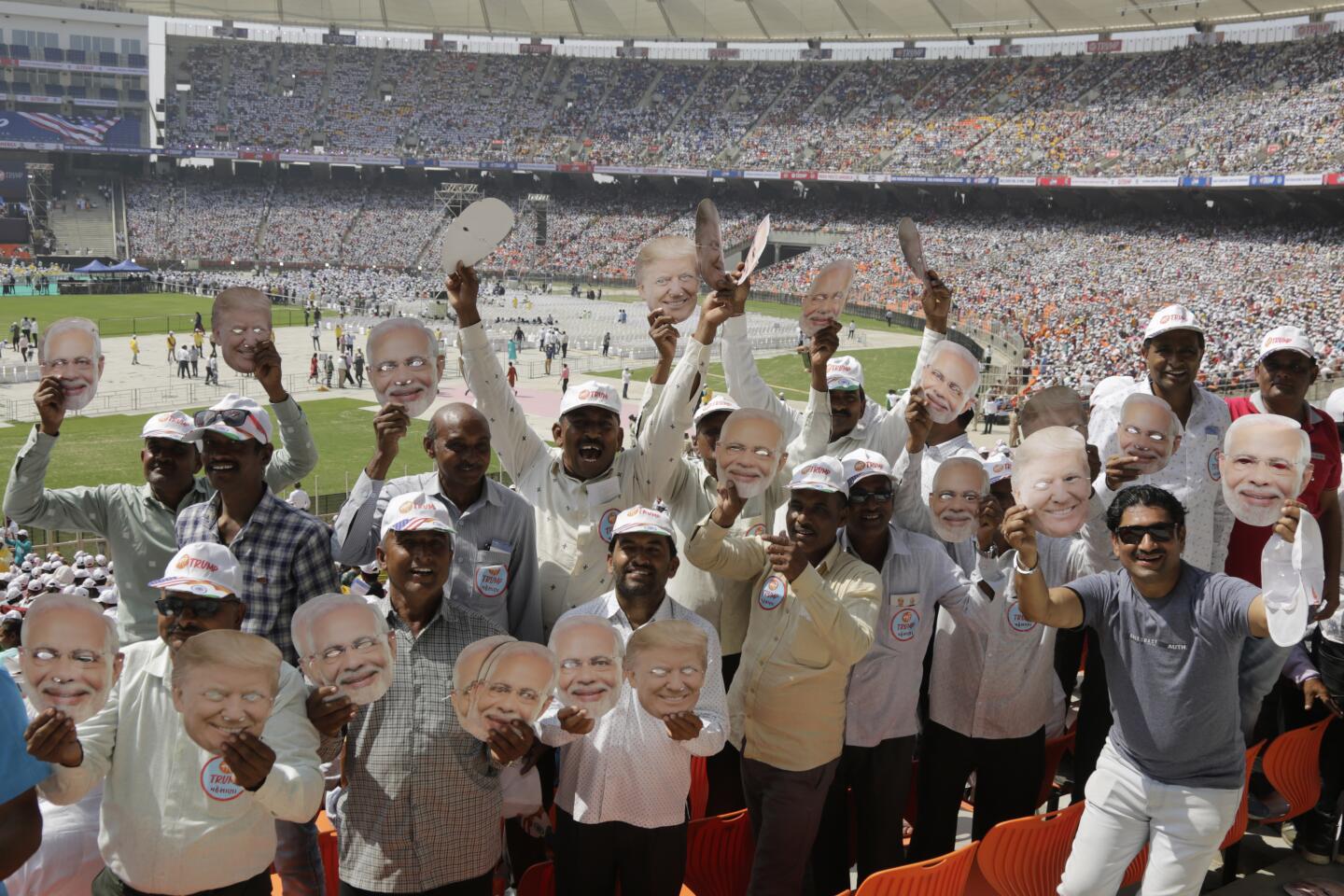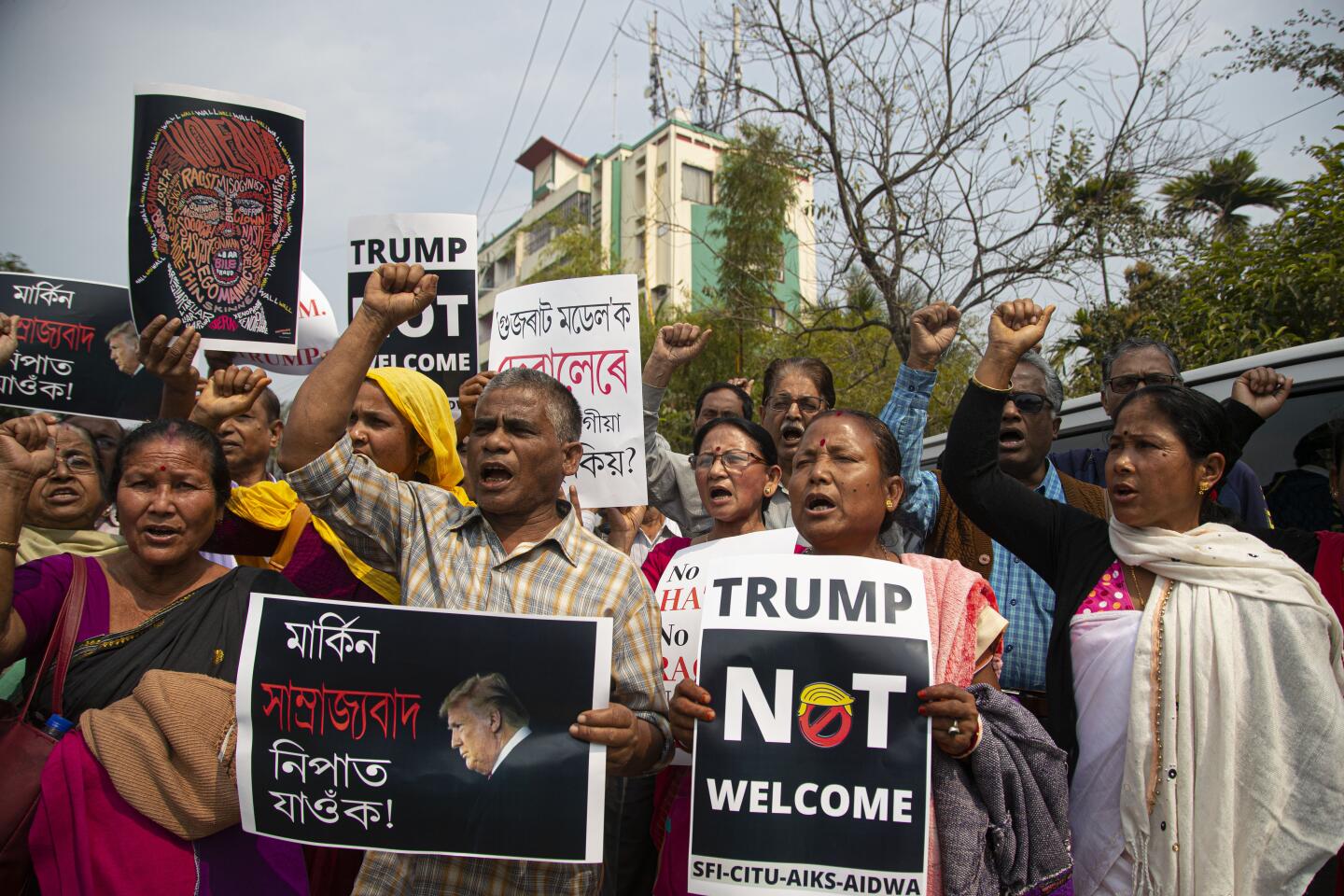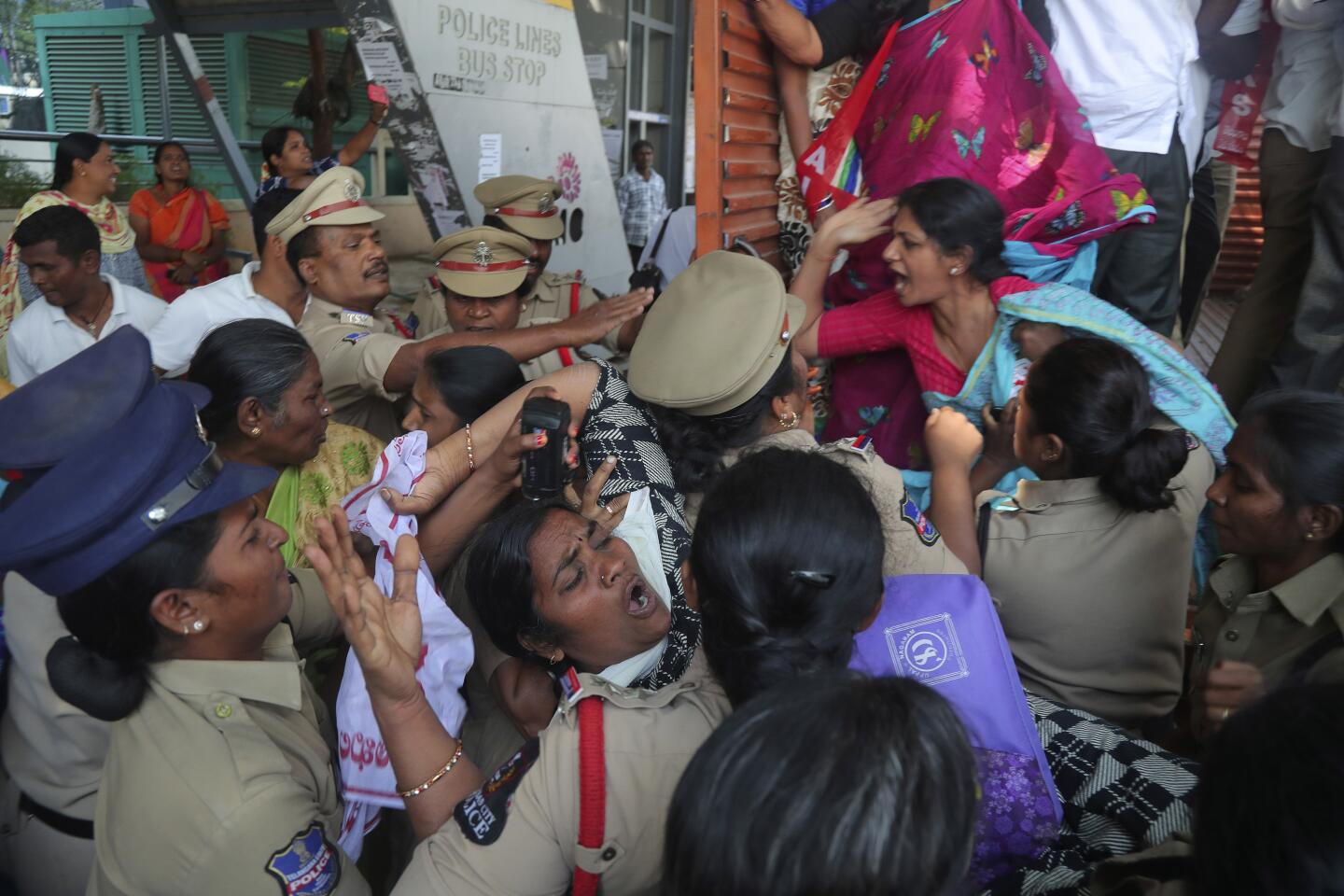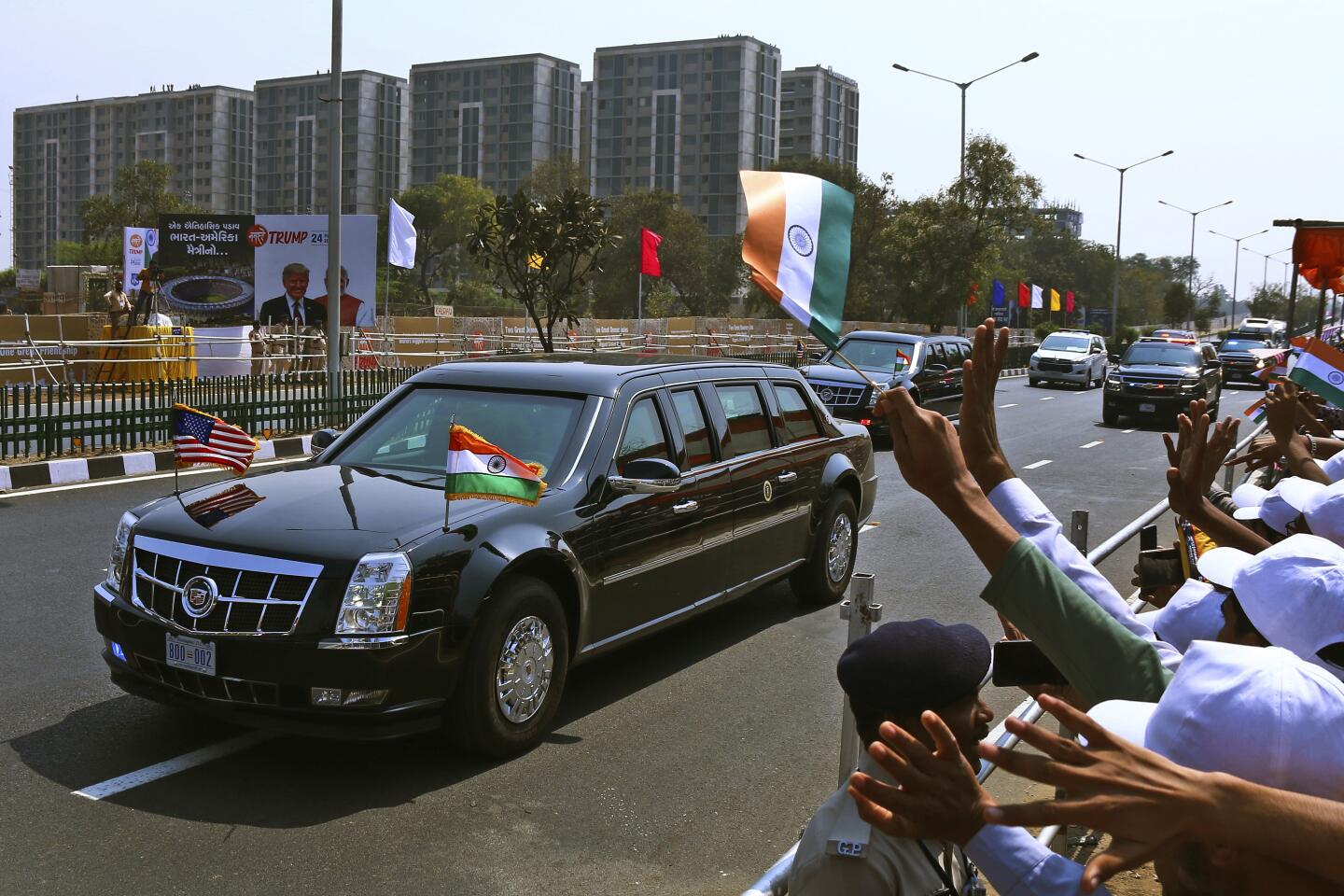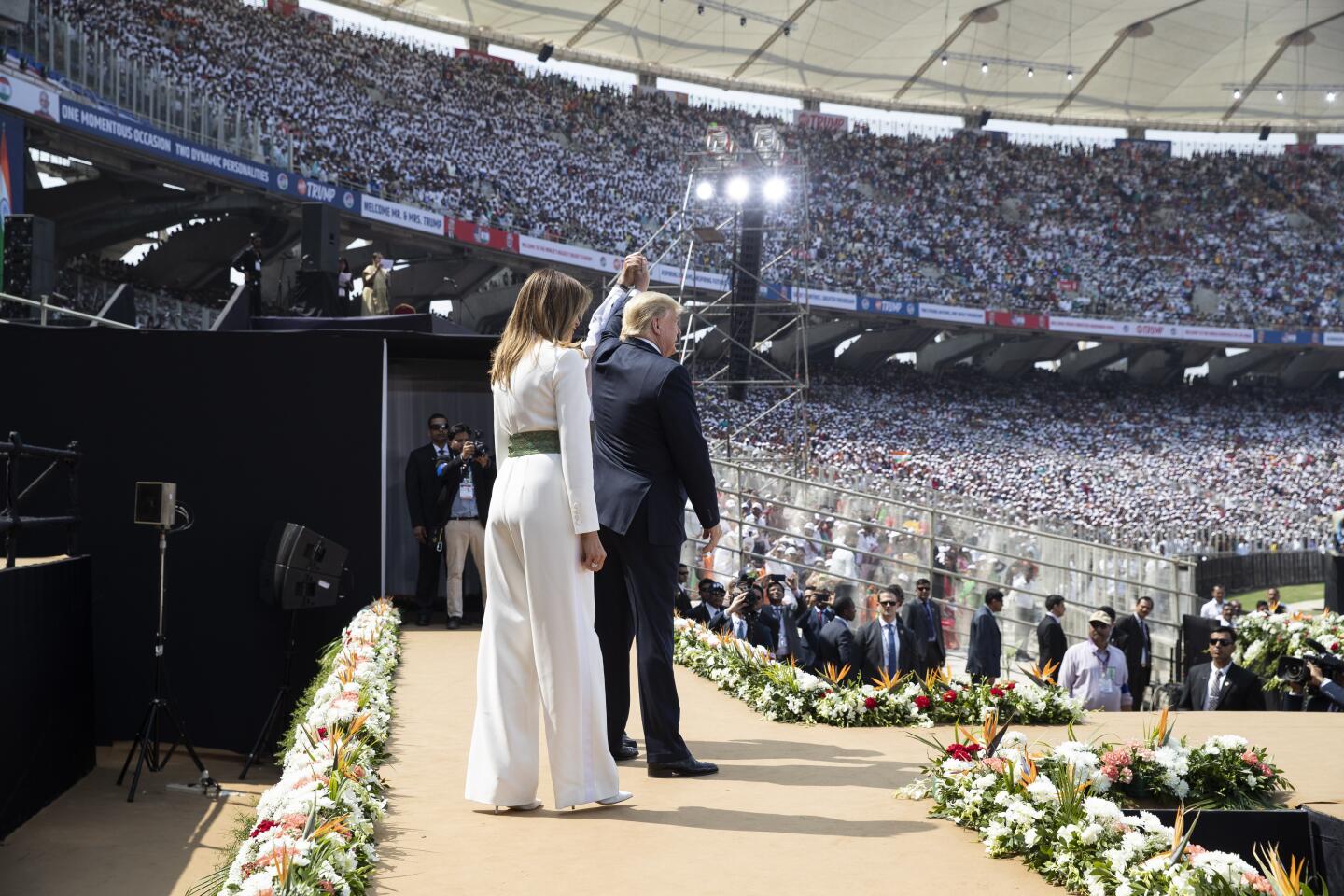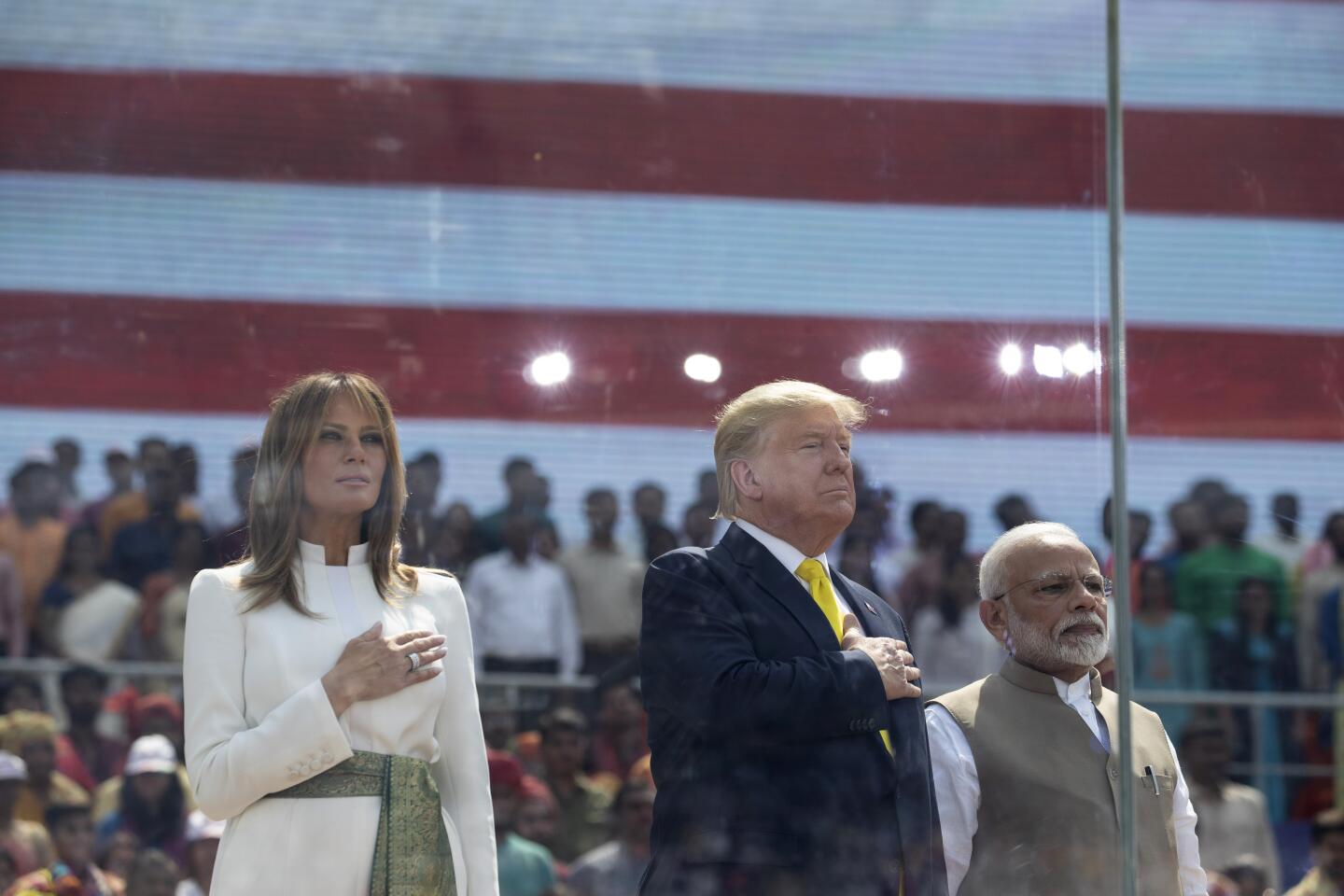In India, Trump revels in huge crowd and Modi’s praise
- Share via
NEW DELHI — President Trump addressed the largest crowd of his political career Monday, celebrating the relationship between the world’s oldest and largest democracies during a speech to a stadium crowd of more than 100,000.
Speaking in 86-degree heat in Ahmedabad, Trump avoided the more charged, controversial rhetoric that typically marks his rally speeches back home, but there was no absence of hyperbole as he and his host, Indian Prime Minister Narendra Modi, lavished praise on each other and offered unbridled optimism about a growing partnership and increased cooperation between the two nations.
“India’s rise as a prosperous and independent nation is an example to every nation in the world and one of the most outstanding achievements of our century,” Trump said. “It’s all the more inspiring because you have done it as a democratic country. You have done it as a peaceful country. You have done it as a tolerant country.”
Although he addressed his words “to every Indian — north and south, Hindu and Muslim, Jewish and Christian, rich and poor, young and old,” and both leaders spoke about the shared value of diversity, the president did not explicitly acknowledge the rise in anti-Muslim violence that has accompanied Modi’s rise to power or his Hindu nationalist government’s efforts to marginalize the country’s 200 million Muslims.
Trump avoided any mention of a new citizenship law passed in December that gives priority to refugees from surrounding countries who are Hindu or adherents of five other faiths, but not Muslims.
The law has generated widespread protests, some of which have been violently suppressed. If there was any implicit rebuke in the president’s vague remarks about shared values, it was delivered in words of heartfelt praise.
“There is all the difference in the world between a nation that seeks power through coercion, intimidation and aggression, and a nation that rises by setting its people free and unleashing them to chase their dreams. And that is India,” Trump said to applause.
A protest turned violent in Delhi on Monday, undercutting the political pleasantries from the two leaders. A policeman was killed trying to enforce a government prohibition on mass gatherings that was activated in advance of Trump’s visit.
In 2015, President Obama toured the country with Modi and delivered a speech that urged support for religious freedom and human rights, although he muted his language to avoid confrontation with his host.
“Every person has the right to practice their faith how they choose,” Obama said during that visit, “or to practice no faith at all, and to do so free from persecution and fear.”
Trump’s rally — which, like his events back home, began with Elton John on the loudspeakers and ended with the Rolling Stones — was the first big show at the new open-air Motera Stadium, a newly constructed 110,000-seat cricket ground that India touts as the world’s largest.
The two leaders took the stage, enclosed by bulletproof glass in front of a large video board, at 1:40 p.m. to huge cheers from a crowd that had been dancing to their walk-up song, “Macho Man.” The two leaders embraced and Modi grabbed Trump’s hand and held up their arms together.
Modi, introduced over the public address system as “the dynamic and dedicated” leader “of the new India,” greeted the president by shouting “Namaste, Trump!” and “India-U.S. friendship!” several times, welcoming him “on behalf of 1.3 billion Indians.”
Although the three presidents before Trump all visited India while in office, Modi said Trump’s visit “imparts a new sweetness and closeness of family ties to the relationship” and said it is “no longer just another partnership — it is a far greater and closer relationship.”
“Namaste,” Trump said as he stepped to the podium, beginning his half-hour speech by thanking the crowd and expressing America’s love and respect for India. “From this day on, India will always hold a very special place in our hearts,” he said.
He celebrated Modi’s “moving story,” referencing the prime minister’s early days as a tea seller in Ahmedabad and calling him “living proof that with hard work and devotion, Indians can accomplish anything, anything at all, anything they want.” He touted Modi’s domestic accomplishments, including investments in infrastructure, expanded access to electricity in rural areas and an effort to lift millions of people out of poverty.
“Everybody loves him, but I will tell you this — he’s very tough,” Trump said, claiming that trade talks with India, which have been going on for months, are in the “early stages” but expressing optimism about achieving a “very major” deal in time.
Trump, as he often does at his rallies, boasted about the strength of the U.S. economy and military.
“This is truly an exciting time in the United States,” he said. “Our economy is booming like never before. Our people are prospering and spirits are soaring. There is tremendous love, tremendous like. We like and we love everybody.”
The crowd was a sea of white, as attendees were given hats emblazoned with the logo for the “Namaste, Trump” event. And its pro-Modi — and anti-Muslim — sentiments were evident as Trump spoke.
When the president took credit for rooting out “radical Islamic terrorists” and the “bloodthirsty killers” of Islamic State, the crowd roared in approval. But when he touted his “very good” relationship with the government of Pakistan, an Islamic republic and India’s top geopolitical rival, there was silence.
The event alone was enough to entice the president to fly to India for the state visit, even though the two days of meetings between Trump and Modi are unlikely to yield any major bilateral agreements. The two leaders are expected to announce $3.5 billion in defense contracts on Tuesday, when they are scheduled to hold meetings in New Delhi.
Before departing for India, Trump didn’t hide his excitement about the scale of the rally and fanfare Modi promised to deliver, telling reporters that the crowd was likely to amount to around “10 million” people.
In reality, the crowd outside the stadium numbered around the same as the cricket ground’s capacity, just over 100,000, and many of the stadium’s upper deck seats were empty by the time Trump finished speaking, especially those directly in the heat of the sun.
Trump, who headed from the rally for an afternoon visit to the Taj Mahal in Agra, arrived in Ahmedabad to tremendous fanfare as he stepped off Air Force One around noon to be greeted by Modi, who led him and First Lady Melania Trump down a red carpet lined with soldiers and dancers and drummers dressed in traditional Indian garb.
Tens of thousands of people gathered behind barricades to glimpse the president’s motorcade, which rolled down the empty streets at the pace of a parade float past lines of flag-waving dancers and women in colorful saris.
All around the airport and along the drive were massive billboards and signs bearing images of Trump and Modi with slogans celebrating the visit:
“Two dynamic personalities, one momentous occasion,” several of them read.
Lampposts along the route were festooned with life-size, full-color cutouts of Modi and Trump, giving a thumbs-up. When the presidential limousine pulled into the stadium parking lot, Trump was welcomed by police officers on camels.
He was greeted with more fanfare when he landed in Agra and was treated to a private tour of the Taj Mahal at dusk, as officials closed the famous 17th century mausoleum to the public and cleared out the menacing monkey population, which had caused concerns.
As he strolled with the first lady through the empty garden along the narrow reflecting pool that leads to the ivory marbled dome, Trump expressed awe for the architectural jewel, built by a Mughal emperor as a tribute to his favorite wife, stopping and turning back at various points to pose for the cameras trailing behind.
“Really incredible, an incredible place,” Trump said to reporters as he departed after about an hour.
Before heading to the rally, Trump stopped first at a different sort of place: the Sabarmati Ashram, the spiritual hermitage where Mahatma Gandhi — who, like Modi, was from Ahmedabad — lived for 13 years with his wife until his historic 241-mile march in 1930, when he walked to Dandi in protest of British salt policies and vowed never to return until India was granted independence.
There, too, tens of thousands lined the streets before Trump’s motorcade arrived. They stood six and seven deep in some places, many wearing commemorative white caps bearing a welcome greeting.
The crowd was large but not overwhelming for a country such as India, where popular regional politicians frequently draw masses of supporters to election rallies. But as Trump’s motorcade arrived, many cheered.
About 300 students of Gujarat’s Sola Bhagwat School arrived at 8 a.m. and by midday were wilting in the sun, listlessly waving U.S. and Indian flags.
“We had to come,” one exasperated student said. “Teacher told us to.”
Truck driver Lala Ram walked nearly a mile to see the motorcade go past, saying Modi’s orchestration of the presidential visit showed how the Indian leader had raised the country’s stature in the world.
“He should be prime minister for 25-30 years,” Ram said. “If that happens, there won’t be any need for Indian leaders to travel abroad. Everyone will come to us.”
With Modi as their guide, the president and his wife observed Gandhi’s humble living quarters and even sat on the ground for a moment at his old spinning wheel that he used to make the simple natural cloth garments that he wore.
Trump, wearing a white cloth scarf over his dark suit and gold tie, also scrawled his signature in the ashram’s official guest book.
Unlike Obama, he made no mention of Gandhi in his inscription, addressing it instead to his host.
“To my great friend, Prime Minister Modi — thank you for this wonderful visit,” Trump wrote.
Special correspondent Parth M.N. in Ahmedabad contributed to this report.
More to Read
Get the L.A. Times Politics newsletter
Deeply reported insights into legislation, politics and policy from Sacramento, Washington and beyond. In your inbox twice per week.
You may occasionally receive promotional content from the Los Angeles Times.
